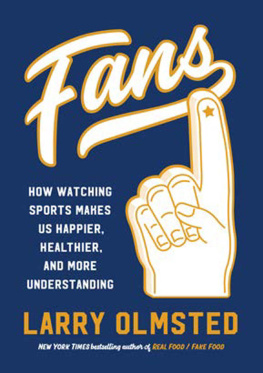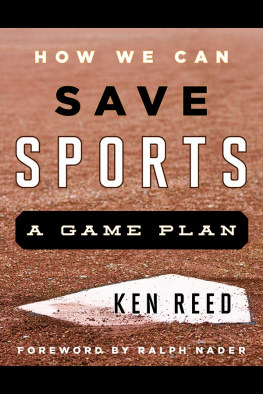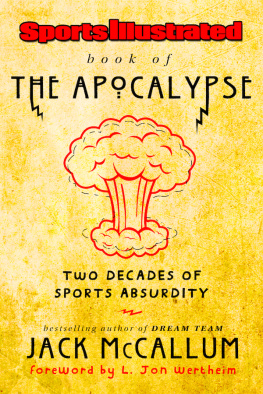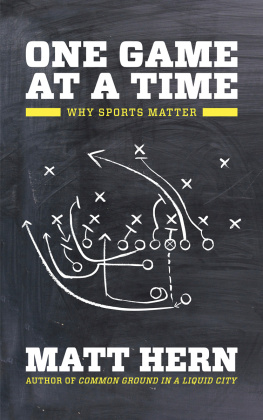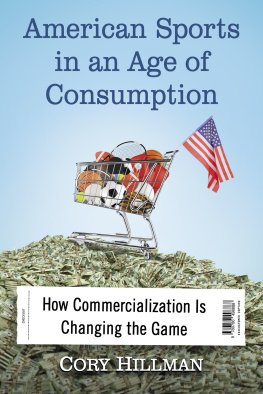Contents
Guide
Page List
Fans

HOW WATCHING SPORTS MAKES US HAPPIER, HEALTHIER, AND MORE UNDERSTANDING

LARRY OLMSTED

Algonquin Books of Chapel Hill 2021
For Allison, Zarafa, Chamonix, and sports fans everywhere
may all your teams do well
(except the Eagles)
contents

Pre-Game
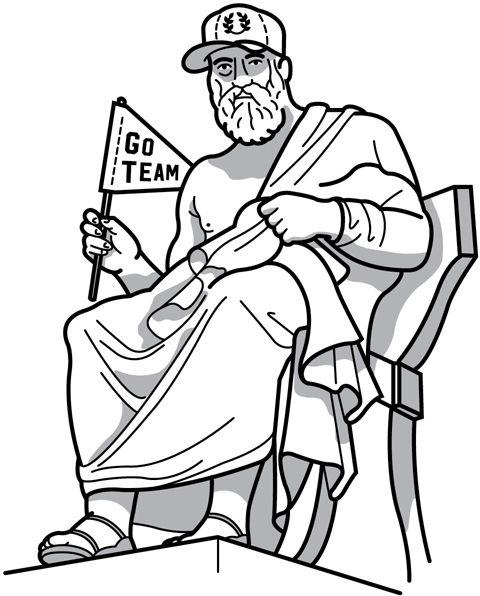

Forty thousand pilgrims would assemble, including the most distinguished members of Greek society. Plato and Pythagoras were always in the front seats. Socrates, Anaxagoras, Demosthenes, Pindar, Herodotus, and even Diogenes came to the games. The barbarians could not understand why the Greeks spent so much time and energy on what seemed to them these childish pursuits Lucian in one of his dialogues puts the answer in the mouth of Solon, the famous political regenerator of Greece and the symbol of wisdom. To this day Solons answer is unsurpassed. You would have to be there, he tells the puzzled barbarian.
C.L.R. James on the Olympics in Beyond a Boundary

S ince perhaps the beginning of time, or at least of organized athletic games, pundits of all sorts, from many fields, including science, literature, history, journalism, and politics, have asked the same question about sports: why do we care so much?
Whether or not sports themselves actually mattera fierce philosophical debate in some quartersthere is no doubt that they are important to us as a society, if only because so many people do care. The forced global absence of organized competition during the 2020 coronavirus pandemic served as a reminder of just how much people love sports and how passionately they miss them when they are gone. We may never know exactly why sports are so important to so many of us, and in this book I decided to ask a different question, one that has received a lot less attention, but one that I consider more enlightening: what happens when we care?
The world is full of sports fans, and I wanted to know what being a sports fan does to us, individually and collectively.
Lets find out.
Game Time
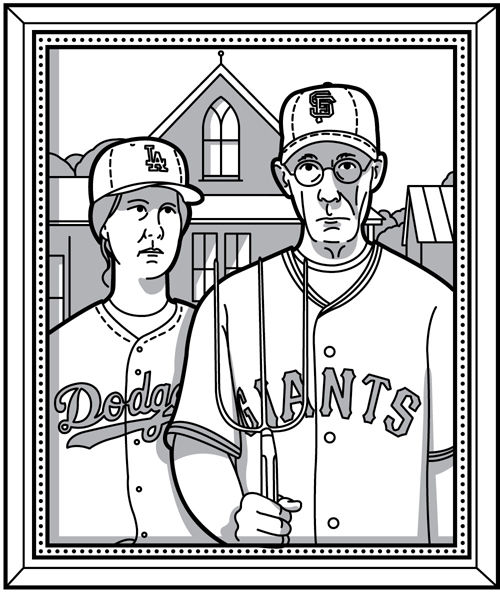

Are you a fan? It is altogether to be hoped, for your psychic health and well-being, that you are. In fact, and in spite of the advice and warnings so freely offered by alarmists and loose thinkers, it is equally desirable for your physical health.
A.A. Brill, MD, The Why of the Fan

O ne of the lengthiest of many conversations Ive had in recent years about sports fandom took place just a few weeks before the Super Bowl, the holiest day in American sports. I went skiing in Jackson, Wyoming, home to one of my favorite ski resorts, and also the town where Kristie Hayes, MD, aka Dr. Kristie, practices family medicineand practices the healthful lifestyle she preaches. In the winter she skis, both at the resort and more often touring in the wilderness backcountry, while in the summer, she hikes and bikesmountain and roaddoes yoga, and is a regular at the gym all year round. Before medical school, she did a few years stint guiding cycling trips for active tour operator Backroads, and during her years at medical school at Dartmouth, part of the college at which I occasionally teach creative writing, we were regular running and road cycling partners. An athletics participant but not a spectator, Dr. Kristie described herself to me, with conviction, as not a sports fan.
We spent an unusually warm and sunny January day skiing Jackson Hole Mountain Resort, and while riding the chairlifts between runs, she asked what my next book was about. Im exploring the effects of sports fandom on individuals and also collectively. Im looking at what it means to be a sports fan, what it does to us, and what it does to society.
She was simultaneously skeptical and uninterested. But to be polite, she asked, Why?
Sports fans have been dissed. Id like to set the record straight.
What do you mean?
I took a breath. So many people, here in America and around the globe, identify themselves as being sports fans. In terms of popularity and participation, its a huge part of our national conversation. The sports section is often the thickest in newspapers, no news broadcast is complete without sports coverage, and sporting events are our most-watched programs of any kind. Yet until very recently, little research has been done into the effects of sports fandom, especially when compared to religion, the most comparable system of widespread group identification and belonging. But the research that has been done, as well as the historical record, overwhelmingly shows that being a sports fan is good for us, good for humanity, and good for the world.
Thats a bold claim and one that seemed to surprise Dr. Kristieand a lot of other people Ive talked to.
She thought about it, then shrugged. I always thought it just seems like a big waste of time.
Heres the thing: when I write the words sports fans, what picture do you see in your mind? Dr. Kristie likely sees an overweight guy in a team jersey sitting on a couch drinking beer with his overweight jersey-wearing friends, and Im not surprised. This is how sports fans have been routinely portrayed for decades in the media, on the most popular television sitcoms, in commercials, and in movies.
Scott Simon, NPR Weekend Edition Saturday host and former international correspondent, is a devoted, dyed-in-the-wool sports enthusiast who wrote a book called Home and Away: Memoir of a Fan. He begins a chapter titled Im a Fan this way: Fans dont get much respect. In literature and pop culture, advertising and conversation, we are often seen as the anonymously clamorous: bug-eyed and beer-swollen Longtime ESPN television producer Justine Gubarand unlikely fan hater, given her professiondescribed the American sports fan in these words: That beer-guzzling, jersey-wearing guy headed to his buddys house to watch football all day
The corpulent lazy guy is a sitcom staple as well as a commercial fixture (personified by Kevin Jamess serial sports fan Doug Heffernan, aka

